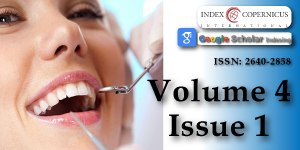Behaviour management during dental treatment!!!
Main Article Content
Article Details
Kulshrestha, R. (2020). Behaviour management during dental treatment!!!. Journal of Clinical Advances in Dentistry, 4(1), 015–016. https://doi.org/10.29328/journal.jcad.1001017
Editorials
Copyright (c) 2020 Kulshrestha R.

This work is licensed under a Creative Commons Attribution 4.0 International License.

